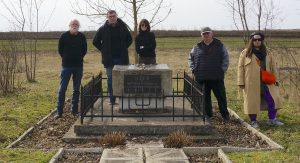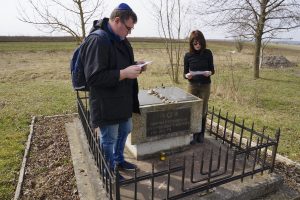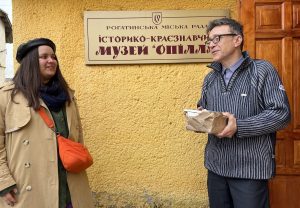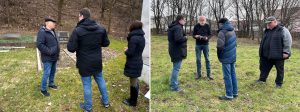For the first time since 2020, Jay and I were able to resume our decades’ long annual tradition of being present in Rohatyn on March 20 to honor the memory of the more than 3000 Jewish victims murdered and buried at the mass grave south of Rohatyn’s city center. Last year we could not be here due to the outbreak of Russia’s unprovoked war against Ukraine, and the year prior due to Covid-19. Now in its second year, Russian criminal aggression continues to target civilians, viciously and unrelentingly destroying residential buildings, hospitals, schools, and cultural heritage sites. Mass graves of innocents once again gather the dead, as they did in Rohatyn on March 20, 1942.
![]() Ця стаття також доступна українською.
Ця стаття також доступна українською.
Joining us this year to commemorate at the site were dear friends and colleagues from Lviv: Sasha Nazar of the Lviv Volunteer Center, a Ukrainian-Jewish civil society arm of All-Ukrainian Jewish Charitable Foundation “Hesed-Arieh”; Olha Honchar, director of the Territory of Terror Museum (Територія Терору) and coordinator of Museum Crisis Center (Музейний кризовий центр); and Alex Dunai, Jewish genealogist and family history researcher. During the war, all three of these generous people have significantly shifted their daily work to support local and national humanitarian efforts, cultural protection projects, and volunteer military supply chains.
Standing before the memorial at the south mass grave, Sasha read aloud El Malei Rachamim (אֵל מָלֵא רַחֲמִים), a prayer for the souls of the departed innocents. I spoke the following words on behalf of my Rohatyn families and other Jewish descendants of Rohatyn who could not be here with us:
Today is a sad anniversary for all of us, regardless of whether we are grandchildren of Rohatyn Jewish families, or Ukrainians living today in this city which we cherish. 81 years ago, here on this open, windy hill, a human tragedy happened which affected all of us who have connections to this city. A great many people – young and old, men, women, and small children – died here under circumstances impossible to imagine.
For many Jewish families, the horrific events of March 20, 1942 at this site irreparably broke their connection to the town: they no longer consider Rohatyn a place to which they want to return. They no longer have family waiting for them here. For some Rohatyn Jewish families, the pain is still too great – even 81 years later – to consider ever making a visit to Rohatyn. But, moments such as this, when we meet – here – to remember together, help to lessen the pain, and to build bridges between the nations and the generations.
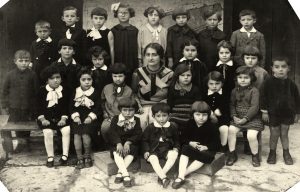
A Hebrew school kindergarten class in Rohatyn in 1937; these are among the innocents lost forever here 81 years ago.
Photo from the Yizkor Book for Rohatyn.
Today, Rohatyners and friends – Jewish and non-Jewish – have come together here to share in collective memory of those who suffered in this place. By our actions, we also offer solace to those living abroad and in Rohatyn today, who know what happened at this place 81 years ago. History, even tragic history, is a part of who we are, and part of what we give forward to our children. We each must believe this to be true, or we would not have come here today, at this site.
On behalf of my Rohatyn families, and on behalf of Rohatyn’s Jewish children, grandchildren, and great-grandchildren living far away, thank you for joining us in this memorial event. Together we keep alive the truth, and the human values which bind us together.
Baruch Dayan HaEmet.
Вічна пам’ять.
During our visit to Rohatyn we also:
-
Delivered more than a hundred copies of the newly-published bilingual edition of Jack Glotzer’s Holocaust memoir to Rohatyn’s city library and the Opillya museum for free distribution to educators and schools. The book was developed by the Ukrainian Center for Holocaust Studies (UCHS) in Kyiv as part of a 3-year Ukrainian-German program “Connecting Memory” in which we have been participating; the book includes a new foreword by the Center’s director and Holocaust historian Dr. Anatolii Podolskyi.
-
Met with Ihor Zalypko and Vasyl Yurkiv to hire them again to cut and clear wild vegetation for us this year at the four Jewish burial sites in Rohatyn. Both men helped us out in 2022 at the cemeteries (old and new), and Ihor has for several years now also been caring for the two Jewish mass grave sites.
- Visited all four Jewish burial sites (the sites look good; no issues to report).

